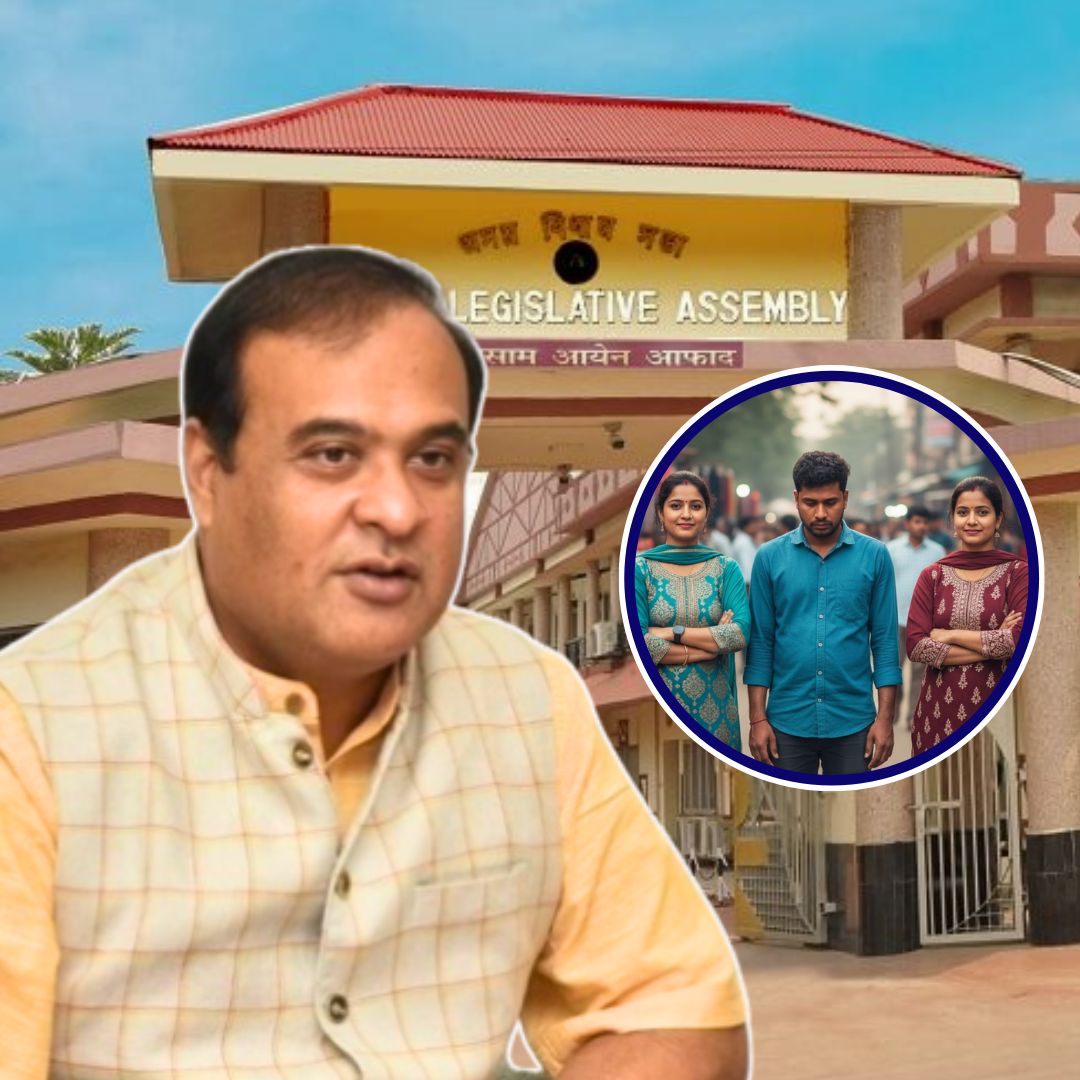The Assam Cabinet has approved the Assam Prohibition of Polygamy Bill, 2025, which bans polygamy with provisions for rigorous imprisonment up to seven years for offenders. The Bill exempts Scheduled Tribe populations and six Sixth Schedule areas, BTAD, Dima Hasao, and Karbi Anglong.
The government will establish a special fund to compensate women victims of polygamy to aid their financial and social rehabilitation. Chief Minister Himanta Biswa Sarma announced that the Bill will be tabled in the Assembly session starting November 25, underlining the move’s goal to protect women’s dignity and eradicate social evils.
Background and Legal Context
Polygamy, the practice of having more than one spouse at a time, has been culturally accepted in some communities in Assam, mainly among Scheduled Tribes covered under the Sixth Schedule of the Constitution, where the law exempts tribal customary practices.
The Bill’s exemption for these areas respects entrenched cultural norms while outlawing polygamous marriages in the rest of the state. Polygamy has long been associated with economic and social difficulties for women, including neglect and legal uncertainties, which prompted the Assam government’s legislative intervention to streamline societal norms and promote gender equality.
असम कैबिनेट ने बहुविवाह की प्रथा पर रोक लगाने के लिए एक नए अधिनियम को स्वीकृति दी है।
— Himanta Biswa Sarma (@himantabiswa) November 9, 2025
नारी का अपमान करने वालों को बख्शा नहीं जाएगा। pic.twitter.com/meYgQdMuyj
Key Provisions and Government Initiatives
The Assam Prohibition of Polygamy Bill prohibits individuals from marrying another person if they have a living spouse or if the previous marriage is not legally dissolved. Offenders may face imprisonment of up to seven years, making polygamy a cognizable offence, facilitating arrests without warrants.
Additionally, priests or others who facilitate such marriages could face up to two years’ imprisonment. A significant feature of the Bill is the creation of a compensation fund for women victims, aiming to prevent their hardship and aid them in rebuilding their lives. Chief Minister Sarma emphasised the government’s commitment to protecting women’s rights and empowering victims of this social malpractice.
In today’s #AssamCabinet meeting, we resolved to:
— Himanta Biswa Sarma (@himantabiswa) November 9, 2025
✅ Prohibit polygamy in Assam (with limited exemptions)
✅ Boost startups & innovation
✅ Grant ₹25 lakh to Assam's pride Uma Chetry for her stellar sporting feat
✅ Enhance Assam's power capacity
✅ Grant land rights to… pic.twitter.com/WLMASfowbI
Exceptions and Exclusions
The Assam Prohibition of Polygamy Bill, 2025, includes specific exceptions and exclusions reflecting cultural and constitutional considerations. Chief Minister Himanta Biswa Sarma made clear that the Bill will not apply to the Scheduled Tribe (ST) populations and will also exclude the six Sixth Schedule areas of Assam at least initially.
These areas include the Bodoland Territorial Council (BTC or BTAD), Dima Hasao, and Karbi Anglong districts. The exemptions respect the customary laws and traditional practices of tribal communities that are constitutionally protected.
Additionally, the Bill exempts minority Muslim residents living in the Sixth Schedule areas before the year 2005. This nuanced exemption acknowledges the historical presence of these communities while maintaining the general prohibition for others.
What is Polygamy
Polygamy refers to the practice of having more than one spouse simultaneously. It commonly manifests as polygyny, where a man has multiple wives, or less commonly as polyandry, where a woman has multiple husbands.
Originating from the Greek words “poly” meaning many and “gamos” meaning marriage, polygamy describes any marital arrangement involving multiple partners at once. Traditionally in India, polygyny was more widespread, particularly in certain communities and regions, including tribal populations in the northeastern states.
Polygamy in India
Legally, polygamy is largely banned across India, except for Muslims who are governed by their personal laws permitting multiple wives under specific conditions. The Hindu Marriage Act of 1955 outlawed polygamy for Hindus, Buddhists, Jains, and Sikhs.
The Special Marriage Act of 1954 also mandates monogamy regardless of religion in civil marriages. The Indian Penal Code criminalises bigamy (marrying another person during a subsisting marriage) under Section 494, punishable by imprisonment.
Exceptions exist where marriages are void or dissolved by courts. Parsis are covered by the Parsi Marriage and Divorce Act, which also prohibits bigamy. Despite legal prohibitions, some polygamous marriages persist culturally, especially among certain communities, but they face growing legal scrutiny and reform efforts such as Assam’s new legislation banning polygamy outside specified tribal areas.through timely financial support.
The Logical Indian’s Perspective
The Logical Indian regards the Assam Prohibition of Polygamy Bill as a testament to progressive policymaking committed to social justice, gender equality, and women’s dignity.
By addressing the hardships faced by women in polygamous relationships and ensuring compensation, the government takes a concrete step towards fostering a society that values empathy and coexistence.
While respecting cultural diversity with measured exemptions, the focus remains on dismantling practices that undermine women’s rights. This law could spur a transformative dialogue on women’s empowerment, justice, and social harmony.
News in Q&A
1. What is the Assam Prohibition of Polygamy Bill, 2025, and what does it entail?
The Bill criminalises polygamy outside specific tribal areas, making it punishable by up to seven years of rigorous imprisonment. It prohibits anyone from marrying another person if their previous marriage is still legally valid and mandates punishment for those facilitating such unions. A compensation fund will be established to support women victims financially. Scheduled Tribes and six Sixth Schedule areas are exempted due to constitutional protections of customary practices.
2. Who is affected by this Bill and when will it take effect?
The Bill primarily targets people in Assam outside the exempted tribal areas such as BTAD, Dima Hasao, and Karbi Anglong. Women in polygamous marriages across the state stand to benefit from legal protection and financial support. The Bill is expected to be tabled and introduced in the Assam Assembly session beginning November 25, 2025, after which it may be enacted.
3. Why has Assam introduced this legislation now?
The Bill responds to increasing awareness about the economic and social hardships faced by women in polygamous relationships, including neglect and lack of legal recourse. It reflects a broader push toward gender justice and equality, aiming to eradicate harmful social practices while balancing respect for tribal customs. The government aims to safeguard women’s dignity and reduce social evils associated with polygamy.
4. What are the legal exceptions and cultural sensitivities involved?
Constitutional safeguards for Scheduled Tribes allow them to continue customary practices of polygamy under the Sixth Schedule, hence the Bill exempts these communities and designated tribal areas. This respects cultural diversity while enforcing monogamy in the rest of Assam, aligning with Indian law, which generally prohibits polygamy except for Muslim personal law and certain tribal customs.
5. What have officials said about the Bill’s impact and implementation?
Chief Minister Himanta Biswa Sarma emphasised the government’s commitment to protecting women’s rights and providing financial support through a dedicated victims’ fund. He described the legislation as a step towards protecting women’s dignity, social welfare, and combating an “evil practice.” Women’s groups have welcomed the Bill, viewing it as a progressive move toward empowerment and justice.










